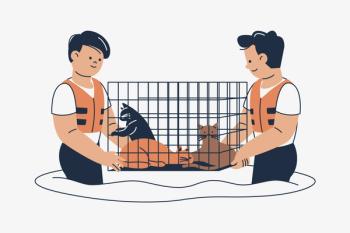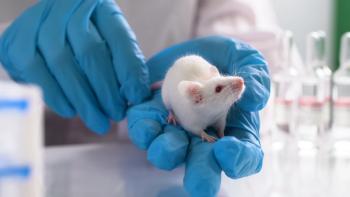
The many faces of animal welfare
East Lansing, Mich. - "Tides go two ways and can be dangerous," says Dr. David Morton, BVSc, PhD, MRCVS, professor emeritus in biomedical science and biomedical ethics at the University of Birmingham in the United Kingdom.
East Lansing, Mich. — "Tides go two ways and can be dangerous," says Dr. David Morton, BVSc, PhD, MRCVS, professor emeritus in biomedical science and biomedical ethics at the University of Birmingham in the United Kingdom.
The welfare debate: Twenty-six speakers converged on Michigan State University to discuss animal welfare and the future impact on veterinary medicine during a three-day conference in November. Pictured above: former U.S. Senator Wayne Allard, DVM (top) and a panel of speakers (lower left) during the AVMA/AAVMC symposium.
Morton was referring to the current trends and debates surrounding animal welfare, and he was one of 26 experts to address issues on this topic at the recently concluded American Veterinary Medical Association (AVMA)/Association of American Veterinary Medical Colleges (AAVMC) Joint International Educational Symposium on Animal Welfare. The Nov. 9-11 symposium at Michigan State University brought together roughly 325 stakeholders to discuss and debate the issues surrounding animal welfare.
Titled "Swimming with the Tide: Animal Welfare in Veterinary Medical Education and Research," Morton cautions that swimming with the tide isn't as easy as it seems. "This is a tide that will not reverse, I suspect," Morton adds. The veterinarian was charged with summarizing and making an action statement at the conclusion of the three-day symposium.
"We need to set our values a lot more clearly than we have in the past," Morton told the audience. "No one else can practice as a vet, and that gives us responsibilities."
Morton created the first department in the United Kingdom to teach medical and dental students healthcare ethics and law and helped to set up the post-graduate animal-welfare science, ethics and law qualifications for the Royal College of Veterinary Surgeons.
Symposium topics ranged from reviews of past animal-welfare principles, what is being done in other countries to further animal welfare, the definition of animal welfare and how animal-welfare topics fit into veterinary education.
But the biggest question raised by many presentations seemed to focus on whether animal welfare should reflect the veterinarian's oath of relieving animal suffering and protecting animal health, or extend beyond the oath by providing all animals "with a life really worth living."
Morton contends that veterinarians have had many opportunites to "stand and be counted, but we did not."
Harmonization is what is needed in the profession, Morton adds, and that includes making a clear set of animal-welfare standards and learning how to use the media to promote them.
Newsletter
From exam room tips to practice management insights, get trusted veterinary news delivered straight to your inbox—subscribe to dvm360.






